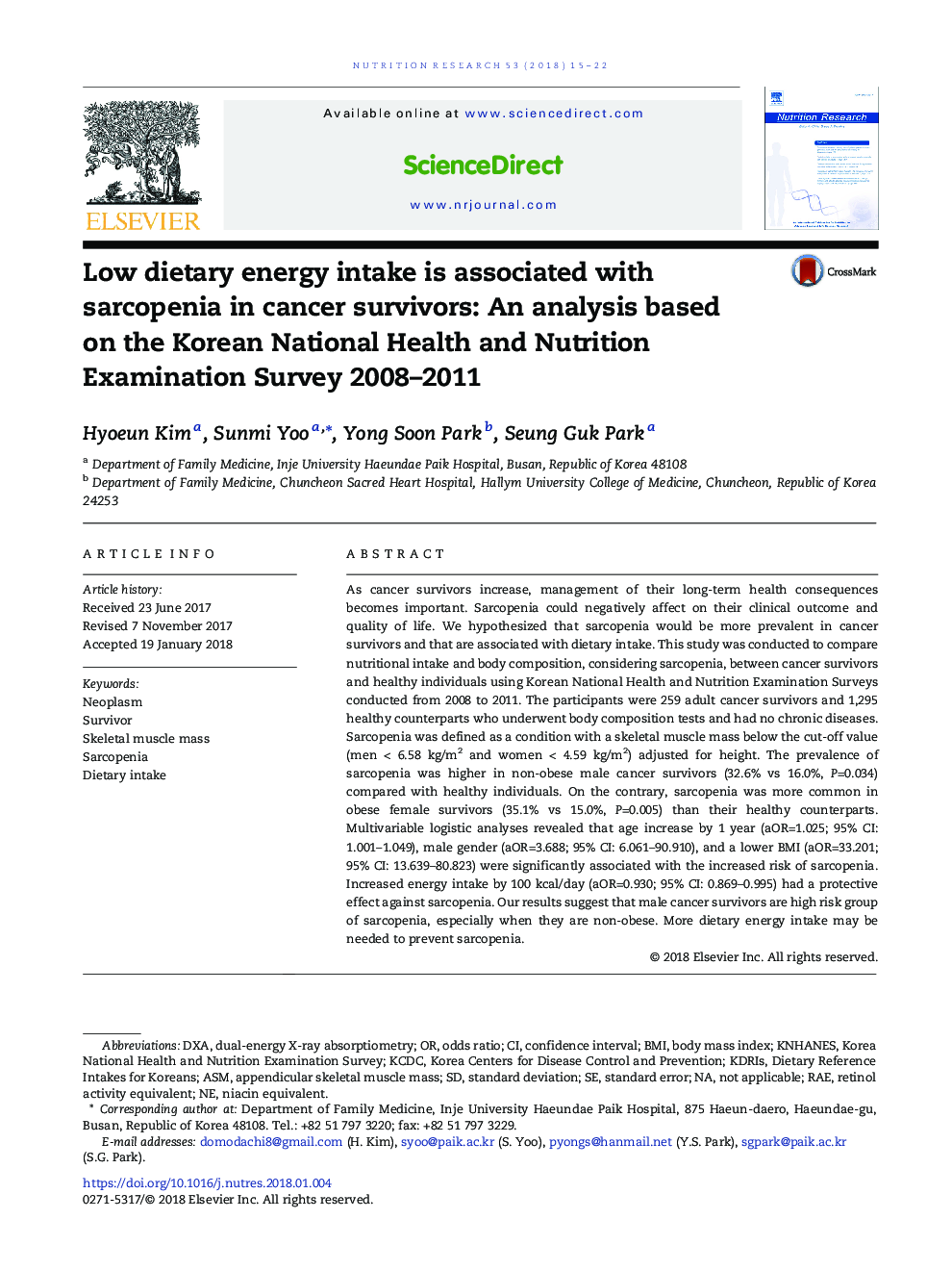| کد مقاله | کد نشریه | سال انتشار | مقاله انگلیسی | نسخه تمام متن |
|---|---|---|---|---|
| 8634161 | 1569092 | 2018 | 8 صفحه PDF | دانلود رایگان |
عنوان انگلیسی مقاله ISI
Low dietary energy intake is associated with sarcopenia in cancer survivors: An analysis based on the Korean National Health and Nutrition Examination Survey 2008-2011
ترجمه فارسی عنوان
مصرف انرژی کم در رژیم غذایی با سرکوپنیا در بازماندگان سرطانی همراه است: یک تجزیه و تحلیل بر اساس نظرسنجی در مورد بررسی بهداشت و تغذیه ملی کره ای در سال 2008-2011
دانلود مقاله + سفارش ترجمه
دانلود مقاله ISI انگلیسی
رایگان برای ایرانیان
کلمات کلیدی
Korea Centers for Disease Control and PreventionKCDCRAEASMKNHANESDXAstandard deviation - انحراف معیارSurvivor - بازماندهKorea National Health and Nutrition Examination Survey - بررسی ملی بهداشت و تغذیه کره جنوبیSkeletal muscle mass - توده عضلانی اسکلتیAppendicular skeletal muscle mass - توده عضلانی اسکلتی آپاندیکالdual-energy X-ray absorptiometry - جذب اندازه گیری اشعه ایکس دوگانه انرژیstandard error - خطای استانداردbody mass index - شاخص توده بدنBMI - شاخص توده بدنیconfidence interval - فاصله اطمینانnot applicable - قابل اجرا نیستDietary intake - مصرف غذا retinol activity equivalent - معادل فعالیت رتینولNeoplasm - نئوپلاسمodds ratio - نسبت شانس هاSarcopenia - کم ماهیچگی
موضوعات مرتبط
علوم زیستی و بیوفناوری
بیوشیمی، ژنتیک و زیست شناسی مولکولی
علوم غدد
چکیده انگلیسی
As cancer survivors increase, management of their long-term health consequences becomes important. Sarcopenia could negatively affect on their clinical outcome and quality of life. We hypothesized that sarcopenia would be more prevalent in cancer survivors and that are associated with dietary intake. This study was conducted to compare nutritional intake and body composition, considering sarcopenia, between cancer survivors and healthy individuals using Korean National Health and Nutrition Examination Surveys conducted from 2008 to 2011. The participants were 259 adult cancer survivors and 1,295 healthy counterparts who underwent body composition tests and had no chronic diseases. Sarcopenia was defined as a condition with a skeletal muscle mass below the cut-off value (men < 6.58 kg/m2 and women < 4.59 kg/m2) adjusted for height. The prevalence of sarcopenia was higher in non-obese male cancer survivors (32.6% vs 16.0%, P=0.034) compared with healthy individuals. On the contrary, sarcopenia was more common in obese female survivors (35.1% vs 15.0%, P=0.005) than their healthy counterparts. Multivariable logistic analyses revealed that age increase by 1 year (aOR=1.025; 95% CI: 1.001-1.049), male gender (aOR=3.688; 95% CI: 6.061-90.910), and a lower BMI (aOR=33.201; 95% CI: 13.639-80.823) were significantly associated with the increased risk of sarcopenia. Increased energy intake by 100 kcal/day (aOR=0.930; 95% CI: 0.869-0.995) had a protective effect against sarcopenia. Our results suggest that male cancer survivors are high risk group of sarcopenia, especially when they are non-obese. More dietary energy intake may be needed to prevent sarcopenia.
ناشر
Database: Elsevier - ScienceDirect (ساینس دایرکت)
Journal: Nutrition Research - Volume 53, May 2018, Pages 15-22
Journal: Nutrition Research - Volume 53, May 2018, Pages 15-22
نویسندگان
Hyoeun Kim, Sunmi Yoo, Yong Soon Park, Seung Guk Park,
